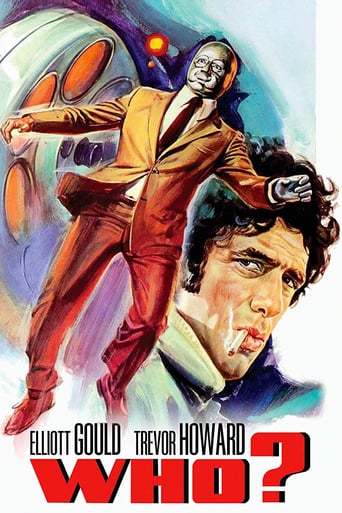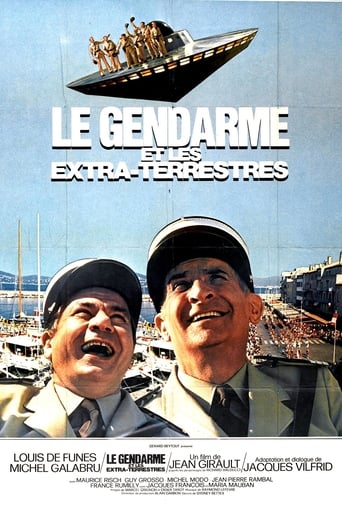rabbitmoon
Some of the negative reviews here seem to be because of not paying proper attention to the story (particularly, understanding the clever flashback structure), and/or getting hung up over the makeup/tin head effects. Its a huge shame that these might dissuade people from seeing this brilliant film. The appearance of Lucas Martino (the tin man) is irrelevant. What matters is that all the FBI has to go on to identify him is his responses. Another reviewer (no doubt distracted by facebook rather than actually watching) mentioned 'why don't they just compare his fingerprints?' but its explained in the film that whilst the arm may belong to Martino, it doesn't guarantee that the head/mind does. At its heart, the film explores a fascinating theme about identity, what makes a person who they are in a way that couldn't be imitated and taught to someone else. Between the lines is a chess-game style thought-battle between two sides, figuring out what to do with this guy, and trying to solve the puzzle of how to prove that someone is who they say they are. There's a desperate, tragic and lonely feeling underlying the conversations, when trying to distill the very essence of a person's humanity. What really makes the idea work is the meticulous structure of the film - we see the present day situation of the FBI trying to figure out who he is, intercut with flashbacks of the Russians questioning him and figuring out whether to send back a spy instead. So the audience has to think and consider all the angles along with both the Russian spy commander and the FBI agent, trying to second guess events but never really knowing for sure who the man is (or more importantly - HOW to know) until the very end. I've seen this film at least six times and still enjoy its ideas and main philosophical puzzle each time, despite knowing the outcome. Its such a great shame that people are so blind-sided by the lack of action, the dodgy makeup effects, the woeful mis-marketing and obvious low budget of the film to recognise what is actually a great story, and a very intelligently structured film. There are two particularly ropy moments - a car-chase/shootout at an airport, and a completely pointless/unnecessary moment where an agent chases our mystery man across a road, runs into the side of a car, then leaps over its hood and ends up dead. Next scene: mystery man says "Sorry about Finchley". FBI agents ignores it, moves into next line of questioning. Its pretty absurd. If these stupid shoe- horned attempts at 'action' were cut out completely, it would be a better film. I would love to see a polished remake of this story by someone like Chris Nolan or Denis Villeneuve - taking the flashback structure and running with it to really explore the themes and push the emotional side into new territories. It would surely be a classic of philosophical sci-fi. Genuinely, this is one of my favourite movies of all time.
Leofwine_draca
WHO? is an interesting little Cold War thriller with an existential theme. It involves a top American scientist who is involved in a car accident in communist Germany. When he's returned home, due to horrific burns his whole head is encased in a metal mask, which makes him look like a robot. However, the powers that be question his very identity, and wonder whether he is in fact a Russian spy...It's certainly an intriguing set-up, and what I loved about this film is that it deals with questions of identity and existence in a thought-provoking way. The whole movie hinges on the acting of Joseph Bova inside the mask, and very good he is too, despite looking ridiculous. He brings a real sense of sadness to the part so that you feel for his plight.The mystery aspects of the storyline are acceptable, and there are a few action scenes to perk things up a little bit. Elliott Gould is the nominal protagonist in this one but he plays rather a dull and stuffy character, although Trevor Howard is fun in his flashback scenes. WHO? isn't an entirely successful film, which is why it's virtually forgotten these days, but it's definitely worth a look for those with a penchant for offbeat cinema.
Rindiana
Just when you think Cold War espionage films can't get any more absurd, along comes this positively robotic sleep-inducer, which strives to be much more clever than it actually is.To be frank, the plot itself has opportunities for a nice if silly play on identities and the shuffled chronology offers a good basic premise, but it's all ruined by weak direction, a lame narrative, lackadaisical acting (although Gould is his usual lovably crumpled self) and a terrible score.Dumas used an iron mask to much better effect...3 out of 10 ridiculous car chases
Jonathon Dabell
"Who?" is an intriguing, low-key, totally unusual Cold War thriller that has faded undeservedly into obscurity. While not a lost classic by any stretch of the imagination, it remains a commendable little film which explores issues of identity and political paranoia in an affecting way. Based on an Algis Budrys novel, and adapted for the screen by John Gould, it is a film of much talk and little action.... therefore, viewers will need to give it a certain level of attention in order to follow the plot and understand the characters. Those who prefer special effects, explosions and other such brain candy will probably not enjoy it.American scientist Lucas Martino (Joseph Bova) is badly injured in a car accident whilst in the Eastern Bloc. He is rushed to hospital and saved by Communist doctors, but his face and much of his body is so grotesquely disfigured that they have to use metallic plating to rebuild him. By the time Martino is "repaired", he looks more like a robot than a man. A while later, Martino is returned to the U.S, but his startling new "look" arouses immediate suspicion. The American government wonder whether the real Martino has been sent back to them or if they have, in fact, been handed a Soviet spy disguised as this strange robotic man. Agent Sean Rogers (Elliot Gould) is given the task of interrogating the robotic man, to find out if he is who he claims to be or an impostor. Martino insists that he is still the same man, and that only his appearance has altered, but Rogers suspects that there is more to the case than meets the eye. Could the whole thing really be an audacious Russian spy plot? Or perhaps the Americans DO have Martino but he has been brainwashed by the Russians into carrying out espionage activities for them? Or maybe even the bewildered metal man is genuinely telling the truth, struggling to come to terms with his incredible new appearance in a paranoid world where all around him refuse to trust him?Gould is good as the "hero", a man whose sense of accountability towards national security motivates, and occasionally clouds, his quest for the truth. Also good is Trevor Howard as the Russian Colonel Azarin, who is seen in flashback trying to brainwash the injured Martino (not until the end of the movie do we learn if his brainwashing efforts were successful). But best of all is Joseph Bova as the robotic victim, evoking a mix of sympathy and suspicion with his voice and mannerisms, despite the fact that his face is concealed behind an inexpressive metal mask. Indeed, "Who?" is a well-acted offering throughout. The film's faults lie elsewhere. Jack Gold's direction is too pedestrian and low-key for the movie's own good. Many of the scenes are so dully staged and detached and grey that the film has a somewhat cold feel to it. An air of cynicism hangs over the proceedings - one might almost call it "anti-entertainment" or "anti-cinema". This actually damages the film in some ways and undoes the effect of the good performances and thought-provoking story-line. I'd still recommend "Who?" if just for its relatively strange ideas, but it is undoubtedly a picture that could have amounted to much, much more.


